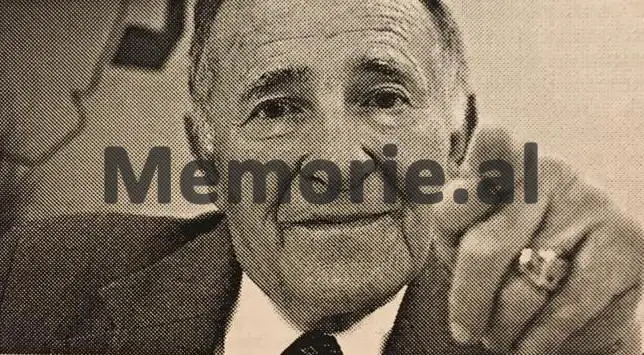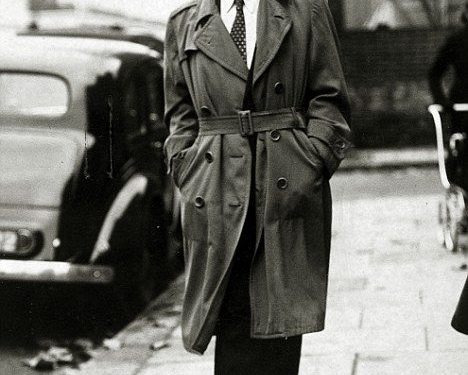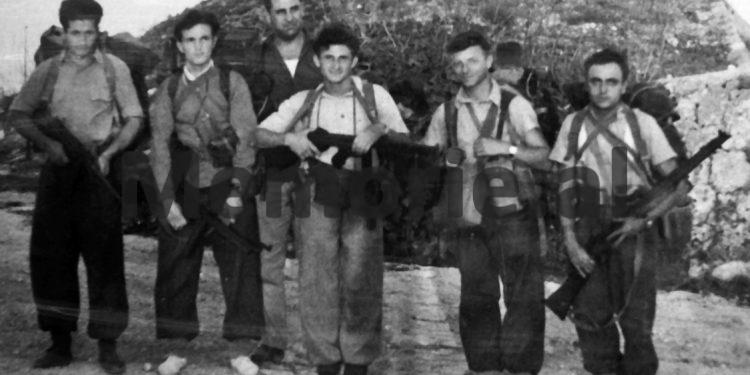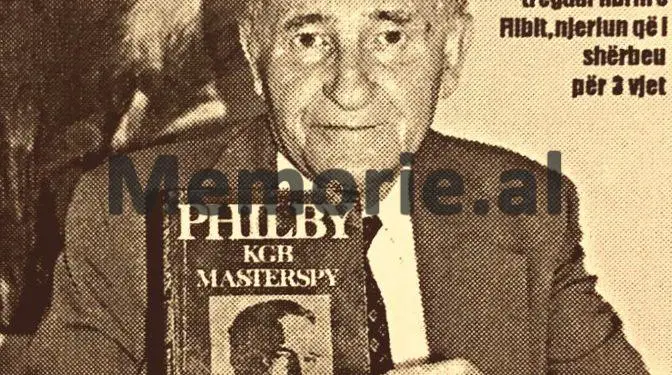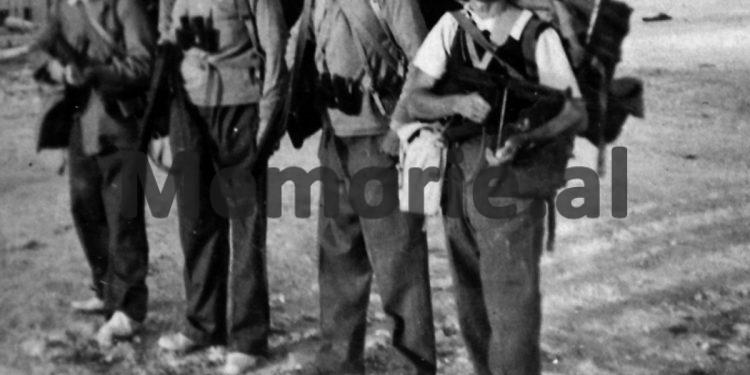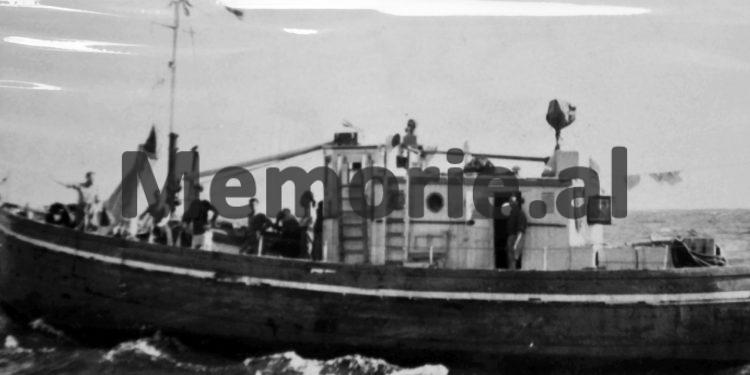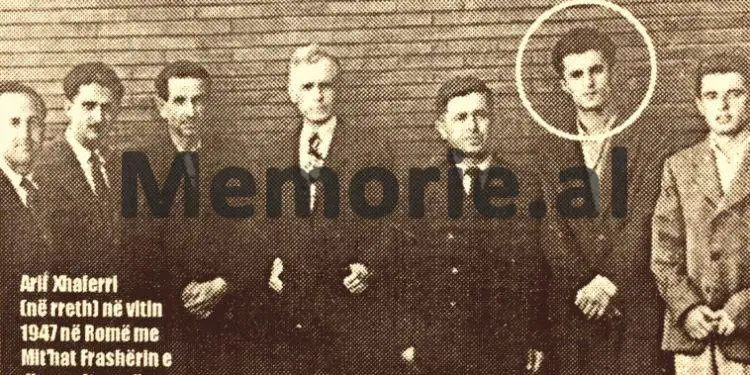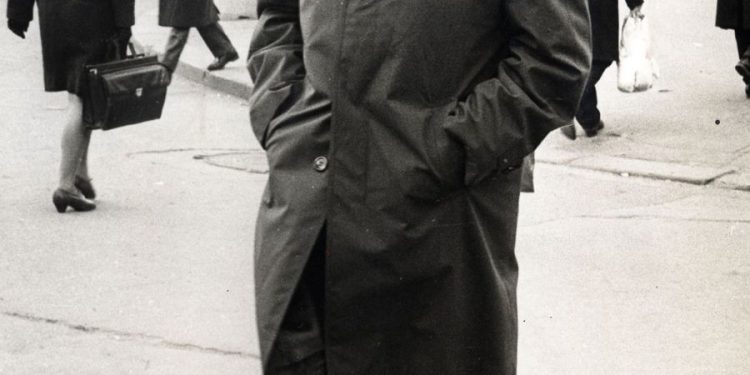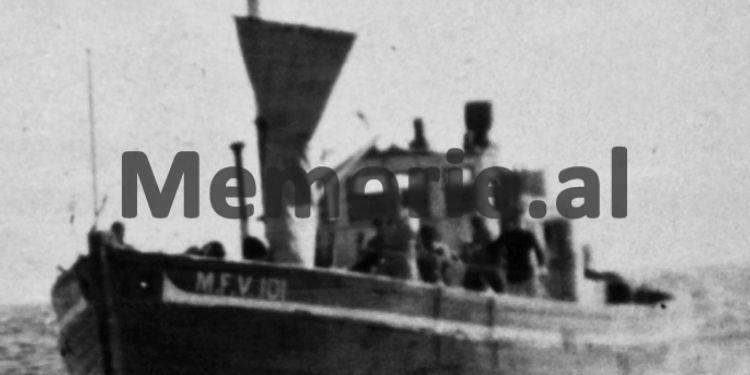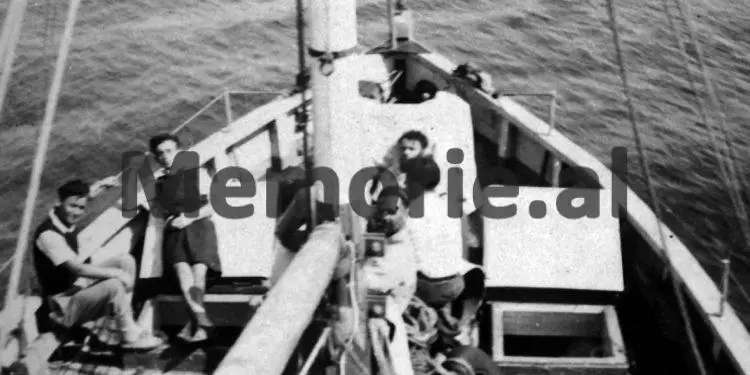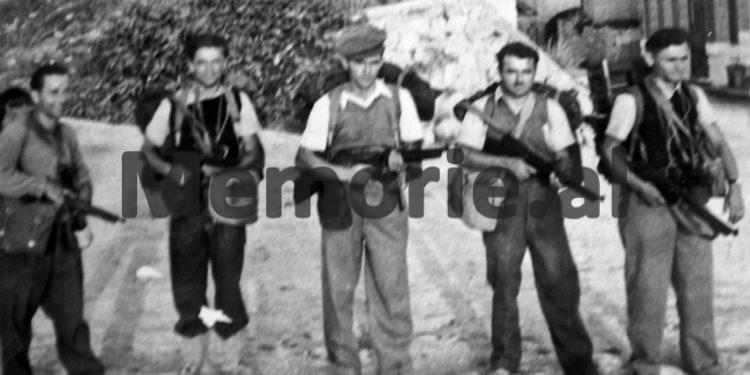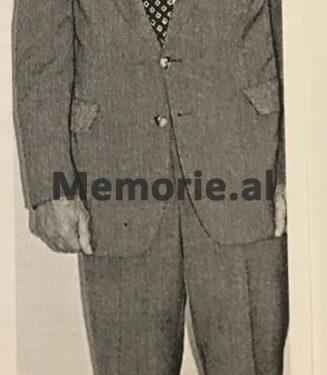Dashnor Kaloçi
Memorie.al publishes the unknown story of Albanian anti-communist groups that were taken by the Anglo-Americans and sent to the secret base in Malta, where they were trained by the British intelligence colonel, Harold Adrian Russell, otherwise known as Kim Philby, the well-known agent high-ranking member of the Anglo-American intelligence service, who later served in the Soviets, serving the KGB with great zeal, where he died in 1988, having worked for years for the Russians deconstructing much of the operations that the Anglo-Americans had undertaken with their secret services in some countries of the Communist East, such as Albania. Rare testimony of Arif Xhaferri, originally from the village of Sasaj in Saranda, the former ballist who fled Albania in November 1944 and was sent by the “Free Albania” Committee with the group of Albanians trained by Philby in Malta and landed several times in communist Albania. Xhaferri’s return to his homeland for the first time in 2005, where he testified for the first time about his adventure with groups of saboteurs in communist Albania and Korea…?!
He left Albania at the age of 16 in November 1944 together with the main exponents of the National Front of Legality and returned to his homeland after almost 50 years of political emigration. Half a century in and foreign with a troubled life having no news of that part of the family he had left in his hometown in the village of Sasaj in Saranda. In 2005, when he was 77 years old, Arif Xhaferri, living in Chicago, USA, came for the first time for a visit to his relatives in Albania and we had the opportunity to meet and interview him. As he at that time, was one of the only three Albanians left alive, of those who half a century ago had served under the orders of the English colonel of the Intelligent Service, Kim Philby. Or rather the man who betrayed his homeland and because of his communist convictions was put in the service of the Soviet KGB by becoming one of the agents who, among other things, deconstructed all Anglo-American operations in communist Eastern countries, including and Albania. Arif Xhaferri testified to us then all his adventure under the orders of Kim Philby from whom he trained, instructed and special tasks in his secret missions in Libya, Korea and Albania, where he landed three times by sea, land and air in years 1948-1951. Before we get acquainted with the interview we received at that time, Mr. Xhaferri, at the beginning of this article we are publishing a short story of his life and the Xhaferri family from the village of Sasaj in Saranda, until the day he was put in the service of the Anglo-Americans.
Xhaferri, a villager from Sasaj, Saranda, who left with the ballistas in ’44 and served 19 years in the Illinois police in the USA
Arif Xhaferi was born in 1928 in the village of Sasaj in Saranda, where his family originated, which at that time was engaged in livestock and oil production. During the occupation of the country, Arif Xhaferri’s family had a tragic fate after he lost three brothers and his father, Izet, who was killed in unknown circumstances in 1942 in Gjirokastra. Based on this, in the same year Arifi left his native village and after staying for a while with his brother, Zyberi, who worked in the city of Durrës, he left Durrës and came to Tirana where he started working as an apprentice in the Cinema “Kosova ”. During the years 1943-’44 he engaged with the Youth of “Balli Kombëtar” and together Bajram Golemi, Luan Dostin, Rizvan Bank, etc., participated in several activities and actions of that nationalist youth organization. Due to that commitment, in November 1944 he was forced to leave Albania together with the main exponents of the National Front and Legality. After staying for three years in camps in Italy, in 1948 he was recruited by the English secret services and sent for three years to the island of Malta. In 1951, of his own free will, he was released from military service and settled in Chicago, USA, where he started a family by marrying a girl of English descent named Egnes. From that marriage four sons were born: Drini, Kalemi, Fatmir and Arifi (junior). In 1970, Arif’s wife died of a heart attack, and a few years later his son, Kalemi, died at the age of 34. From the time he settled in the US until 1997, Arifi worked for 15 years in a private restaurant of his own and another 19 years in the Illinois state police, where he also received the rank of sergeant. While Arifi was living in the USA, in 1960, his brother, Zyberi, who was serving as an officer with the rank of captain of the Albanian Army, fled from Albania, and settled in Vancouver, Canada, where still lives today. Arifi first came to Albania in 1993, and since then he has come to his homeland two more times, where besides his brother Magrib (who lives in Sasaj of Saranda) he also has many grandchildren. While Arif’s eldest son, Drini Xhaferri came to Albania in 1992 working for six months at the Ministry of Defense in Tirana, sent by the US government with a team of American soldiers.
Mr. Arif, under what circumstances did you serve the Anglo-Americans?
In 1948 when UNRRA started distributing Albanian and foreign political emigrants who were in the Italian camps, Mit’hat Frashëri and Vasil Andoni did not want to leave me in the camp, as I was the youngest of all the emigrants. After the “Free Albania” Committee was formed in New York, Mit’hati and Vasili talked to the Anglo-Americans to send me to the island of Malta, along with 40 other Albanian immigrants who were selected from the camps of Italy, Greece, etc., in the framework of the agreement that was made with the Committee “Free Albania”.
Specifically, what was this deal about and what would you do in Malta?
All of us who were chosen to go to Malta would serve the Anglo-Americans both for their needs and for the “Free Albania” Committee that aimed to overthrow the communist government of Enver Hoxha with their help.
When did you go to Malta?
In Malta I went there from the beginning of September 1948. At that time, I was in Rome and there an English officer came and picked me up and left for Malta on an English military plane. There on the island of Malta I was sent to an English military base called Fort Buchanan, which was located within a few walls of an old castle.
What was that base and who commanded it?
It was a military base under the command of the British colonel of the Intelligent Service, Kim Philby, and with him were three other British officers, such as Captain Kew and others.
Can you describe to us how you remember Philby at the time?
Philby was a slender boy about 1.80 cm tall. very polite to his colleagues and subordinates to whom he imposed respect. He was fluent in several foreign languages. The very next day after I got there, Kim Philby called me to the office and, knowing a little English, told me to start a course as a radio operator and assigned me an officer who would give me a course on transceiver radios.
Were there other Albanians there?
A few days later, shortly before other groups of Albanians who had been selected to serve with the Anglo-Americans arrived, Kim Philby took me with him and we flew to Libya on a small military plane. On the way before we arrived at the English military base, Philby told me that he had taken me with him to test me on how far I had progressed in teaching radio. During the tests I did at that military base by connecting radio to the Malta base, Philby was pleased with me and with a smile told me that I had passed the test.
How long did you stay there?
That same night by plane we returned to the base of Malta and after a few days groups of other Albanians started coming there.
Who were they do you remember their names?
The first group that arrived on September 15, 1948 was that of Vlora which included: Hysen Lepenica, Zagoll Shena, Sami Lepenica and Safet Kaba from Çorushi of Mallakastra who was the first cousin of the Albanian Prime Minister, Mehmet Shehu. The second group that arrived there was that of Gjirokastra consisting of: Haki Kaba from Lazarati, Bardhyl Gërveshi, (Lazarati) Pëllumb Sino from Nivica, Xhemal Ibrahimi from Luftinja e Tepelena and Ago Dauti from Rrëzoma e Delvinë. The third group that came there was that of Kolonjë which consisted of: Alo Luarasi, Petrit Butka, Përparim Aliu and Muço Dako. The fourth group that came was that of Skrapar consisting of: Ali Koçollari, Muharrem Blezencka, Izedin Tomorri and Baki Ermenji. The fifth group that arrived there was that of Kurvelesh which consisted of: Ramiz Matuka, Bido Kuka, (from Nivica) Ahmet Kuka, Hysen Isufi, (from Konispoli) Turan Aliko, (Zhulati). In mid-October, a group arrived from Korça where I remember only Seit Piluri and the others I do not remember.
Where and how did those groups of Albanians come from?
All the groups of Albanians who came there, came by British submarines in the greatest secrecy.
After all the Albanians arrived at that base, did they inform you of the purpose of your going there?
Yes, after all the groups of Albanians had arrived, the English officers, led by Colonel Kim Philby, who, unlike the others, always wore civilian clothes, gathered us in a large hall to inform us of the purpose of our visit to that place.
Specifically remember what Philby told you?
I remember now Colonel Kim Philby who told us: “After training here for some time, we will send you on secret missions to your country in Albania. There you will look and observe the situation so that we know whether the people can rise up in revolt against the ruling communist regime, always if there will be any military intervention from outside. You will also look there and get information about the positions of the Russians in that place, where they are located, how many there are, how many Russians are in the genius wards, how many warehouses and barracks they have and where they carry out the works fortification, the task that we will specify exactly before departure “. That’s more or less what Philby told us.
What then did they do to you?
After that we were organized into groups according to districts having each group its own commander and a radio operator. I was assigned to the Gjirokastra group as a radio operator and our commander was Xhemal Ibrahimi. They also gave us the military uniform of the “Royal Army Ordinary Corps” which we should not take off even when we went out in the city
Why were you allowed to go out on the town?
Once the groups were organized we were left free to go out on the town, giving each of us as a start of 50 gold lira.
What was the training like when it started and what exactly where you doing?
The next day we started training and the English officers taught us the types of use of mines, photographing various objects, melee combat with knives, training and shooting with different weapons, climbing and descending rope through rocks, detonating bombs and grenades, lessons on maps etc. After a few days we started preparing to parachute from fighter jets at different altitudes. Our entire training program was conducted with English translators who knew the Albanian language very well.
What living conditions did you have in that military base?
There we had very good conditions and we lacked nothing. There were four of us in a room, and the sheets were changed twice a week. Likewise, the food was very good. We were stationed in a military area where no one was allowed to enter, otherwise we would be eliminated by the guards who did continuous 24-hour service. Once a week we would go to the base depot and get whatever we wanted, food or clothing. After training and lunch, we rested a bit, and at 17.00 we were free to go out in the city where we went to the cinema, billiards, clubs, etc.
Continues tomorrow
Who was Kim Philby?
Harold Adrian Russell, or as he is otherwise known, Kim Philby is considered the most important spy in the history of world espionage. In 9 years of career he rose from the ranks of the British Secret Service (SIS) to become in 1949, British Liaison Officer in Washington, next to the CIA and FBI, a position at the center of Western intelligence against the Union Soviet. Kim Philby was recruited and put in the service of the KGB after coming from studies at Cambridge University and given his long service in the SIS, his chance of penetrating there was quite high. This kind of recruitment and his extraordinary service in favor of the Soviets, made Philby the most successful agent penetrating the secret services, a Soviet spy who had special access to all ranks of Anglo-American secret services. Philby was exposed and deconstructed as an agent of the Russians, before he became chief of British services, and then in March 1963 left for Moscow. But despite this, he severely damaged the Western secret services. One of the places where he deconstructed the Anglo-American plans for the overthrow of the communist governments was Albania, where with his information the Albanian State Security managed to trap dozens of Albanian anti-communists who landed here after being trained by the Anglo-Americans. Americans in their camps. After settling in Moscow, Philby lived in a secret location and never went out in public, and when he did, he was under KGB custody. From 1963 to 1988 staying in Moscow, he maintained silence for 25 years until a few days before his death. Shortly before his death, in an unprecedented move, he invited journalist Philip Knightley to his apartment in Moscow and in 6 days revealed all his secrets./Memorie.al




